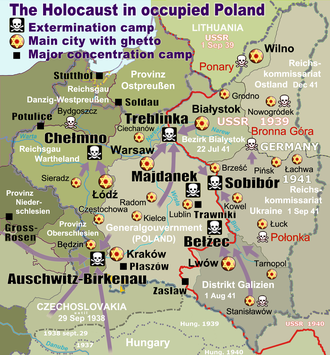Holocaust in German-occupied Poland
Top, clockwise: Warsaw Ghetto burning, May 1943 • Einsatzgruppe shooting of women from the Mizocz Ghetto, 1942 • Selection of people to be sent directly to the gas chamber right after their arrival at Auschwitz-II Birkenau • Jews captured in the Warsaw Ghetto Uprising led to the Umschlagplatz by Waffen SS • Łódź Ghetto children deported to Chełmno death camp, 1942
|
|||||||

Map of the Holocaust in occupied Poland during World War II with six extermination camps marked with white skulls in black squares: Auschwitz-Birkenau, Bełżec, Chełmno, Majdanek, Sobibór and Treblinka; as well as remote mass killing sites at Bronna Góra, Ponary, Połonka and others. Marked with the Star of David are selected large Polish cities with the extermination ghettos. Solid red line denotes the Nazi–Soviet frontier – starting point for Operation Barbarossa of 1941.
|
|||||||
| Overview | |||||||
|---|---|---|---|---|---|---|---|
| Period | September 1939 – April 1945 | ||||||
| Territory | Occupied Poland, also present day western Ukraine and western Belarus among others | ||||||
| Major perpetrators | |||||||
| Units | SS-Totenkopfverbände, Einsatzgruppen, Orpo battalions, Trawnikis, BKA, OUN-UPA, TDA, Ypatingasis būrys | ||||||
| Killed | 3,000,000 Polish Jews | ||||||
| Survivors | 50,000–120,000 | ||||||
| Armed resistance | |||||||
| Jewish uprisings | Będzin, Białystok, Birkenau, , Łachwa, Łuck, Mińsk Mazowiecki, Mizocz, Pińsk, Poniatowa, Sobibór, Sosnowiec, Treblinka, Warsaw, Wilno | ||||||
The Holocaust in German-occupied Poland was the last and the most lethal phase of the Nazi "Final Solution of the Jewish Question" (Endlösung der Judenfrage) marked by the construction of death camps on German-occupied Polish soil. The genocide officially sanctioned and executed by the Third Reich during World War II, collectively known as the Holocaust, took the lives of more than three million Polish Jews. The extermination camps played a central role in the implementation of the German policy of systematic and mostly successful destruction of over 90% of the indigenous Polish-Jewish population of the Second Polish Republic.
Every arm of the sophisticated German bureaucracy was involved in the killing process, from the Interior Ministry and the Finance Ministry; to German firms and state-run trains used for deportation of Jews. German companies bid for the contracts to build the crematoria in concentration camps run by Nazi Germany in the General Government as well as in other parts of occupied Poland and beyond.
Throughout the German occupation, at great risk to themselves and their families, many Christian Poles succeeded in rescuing Jews from the Nazis. Grouped by nationality, Polish rescuers represent the biggest number of people who saved Jews during the Holocaust. Already recognized by the State of Israel, the Polish Righteous Among the Nations include 6,706 gentiles, more than any other nation. A very small percentage of Polish Jews managed to survive World War II within the German-occupied Poland or successfully escaped east beyond the reach of the Nazis into the territories of Poland annexed by the Soviet Union, only to be deported to camps in Siberia along with the families of up to 1 million Polish non-Jews.
...
Wikipedia





